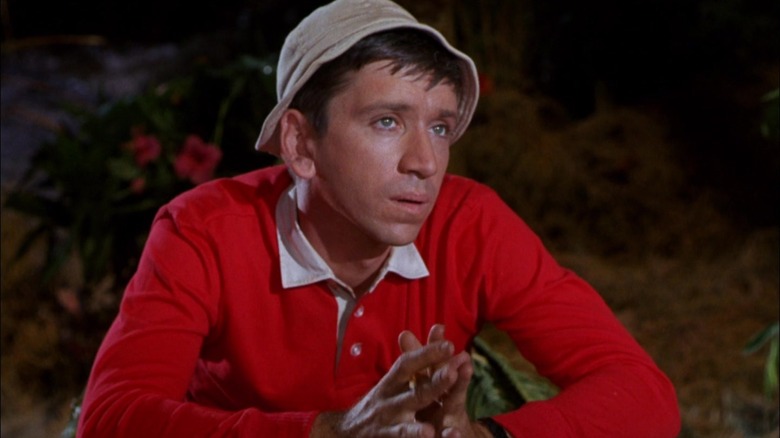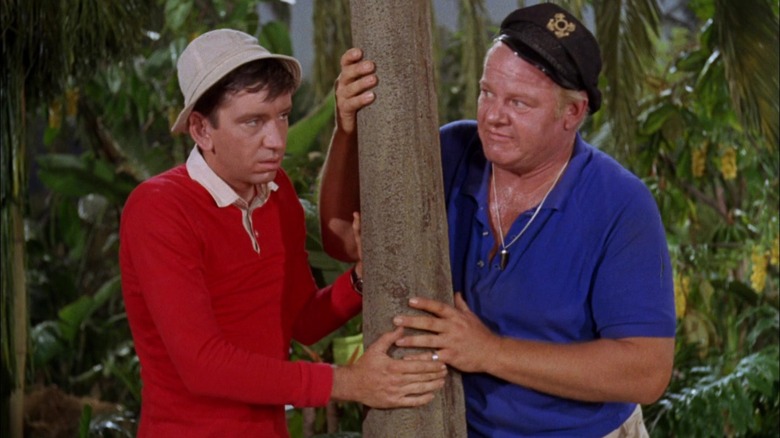Bob Denver Once Explained Why The Humor On Gilligan's Island Doesn't Wear Out
"Gilligan's Island" is simultaneously incredibly important in the annals of television history and one of the dumbest things you'll ever see. It was immensely popular during its three-season run from 1964 to 1967, raking in huge amounts of cash for CBS and its seven lead actors. Thereafter, "Gilligan's Island" landed a plum syndication deal, allowing it to remain in reruns for literally generations, informing culture in a pervasive — some might say insidious — fashion. Show creator Sherwood Schwartz has attached some hifalutin ideas to "Gilligan's Island," pointing out (rightly and fairly) that it represents an idealized model of American democracy operating at peak efficiency. Seven people, all from varying classes and walks of life, are forced to survive together, and, lo, are able to thrive in comfort and peace.
But those ideas rest comfortably in the background of a series that banks on cheap slapstick jokes and broad, unrealistic characterization. There's no real drama on "Gilligan's Island," nor any actual threat to the main characters' lives. There's no lasting conflict, beyond the scenes wherein the Skipper (Alan Hale) swats Gilligan (Bob Denver) with his hat. "Gilligan's Island" is a broad, shallow farce that little kids can enjoy, too friendly, affable, and simplistic to provoke large emotions.
But then, that's by design. Schwartz and the seven cast members all knew exactly what kind of show they were making. Cast members have theorized in the past that the popularity of "Gilligan's Island" stemmed from its ability to offer a brainless escape from a turbulent world.
In an interview with the Kansas City Star (transcribed by MeTV), Denver described the humor on "Gilligan's Island" as "low down," but as a compliment. Indeed, he felt that the humor on "Gilligan's Island" was weirdly timeless, comparable to the silent comedians of 45 years earlier.
Bob Denver felt that Gilligan's Island was kinda dumb, but that's what made it timeless
And Denver has a point. The actor had a talent for playing a certain kind of clueless boob, but he was an observant performer who knew his comedy history. He understood that, of all types of humor, slapstick ages the best, as it is typically unreliant on political knowledge or historical context. It doesn't necessarily stimulate the brain, low slapstick, but it's always going to be funny to watch someone run into a wall. As Denver put it:
"It's the kind of Chaplin, Laurel & Hardy fun that could last a long time. [...] I'm thinking of a 5-year stretch with the show. This kind of slapstick doesn't wear out."
This interview was conducted when "Gilligan's Island" was still on the air, so Denver didn't yet know that it would only last three seasons. It likely would have lasted longer if there hadn't been a kerfuffle at CBS over "Gunsmoke."
Regular "Gilligan's Island" director Jack Arnold (also the director of notable monster movies of the 1950s as well as early Clint Eastwood appearances) pointed out that the cast members of "Gilligan's Island" were always 100% professional and were 100% committed to their roles. Everyone seemingly knew that the series was a lightweight goof, and they understood that the gig required devotion and tenacity. Few might describe Bob Denver or Alan Hale as great actors, but Jack Arnold wanted to change that prejudice. He said:
"The public doesn't realize how good both of those boys are as actors. Like racehorses responding to a jockey, they gave me everything they could. That kind of enthusiasm, plus the fact that I turned every dialogue joke into a sight joke, is responsible, in my opinion, for the success of the show."
Arnold wasn't being modest, but then, he didn't need to be. It's likely his work, in tandem with the cast, that made the series sing. Is "Gilligan's Island" dumb? Yes. Is it a seminal American text that will age mostly well? Also yes.

